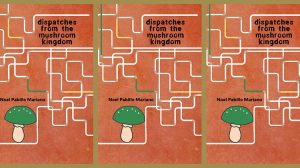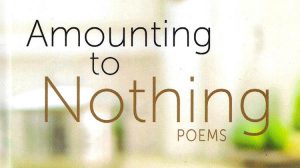The Perseverance by Raymond Antrobus / Penned in the Margins / 2018 / 91 pages
 Raymond Antrobus’ latest book, The Perseverance, opens with a sentence from American poet Robin Coste Lewis: “There is no telling what language is inside the body.” This enigmatic statement asks what language truly is. Language, as suggested by Lewis, exists in the realm of the interpersonal between humans, a means of bridging people. Yet it does not emerge fully formed, for beneath the apparent solidity of a word lies intention, meaning, and personal experience. The shape of language is thus given shape through voice and validated by hearing. If so, what is language to those who are born lacking the facility to hear it? This question is a key consideration for Antrobus, who finds himself working with an art form whose origins are oral in nature.
Raymond Antrobus’ latest book, The Perseverance, opens with a sentence from American poet Robin Coste Lewis: “There is no telling what language is inside the body.” This enigmatic statement asks what language truly is. Language, as suggested by Lewis, exists in the realm of the interpersonal between humans, a means of bridging people. Yet it does not emerge fully formed, for beneath the apparent solidity of a word lies intention, meaning, and personal experience. The shape of language is thus given shape through voice and validated by hearing. If so, what is language to those who are born lacking the facility to hear it? This question is a key consideration for Antrobus, who finds himself working with an art form whose origins are oral in nature.
The Perseverance opens with “Echo”, a poem that doubles as both an exploration of Antrobus’ diagnosis of deafness as well as a poem questioning the nature of language. Repetition is deployed in multiple ways, from the aural soundscape that emphasizes the vigorous energy of spoken language [“consonant crumbs / of dull doorbells, sounds swamped / in my misty hearing aid tubes”] to a more philosophical musing as the poem repeatedly questions the nature of ‘What?’ [“A word that keeps looking / in mirrors, in love with / its own volume.”] Throughout the poem, this sense of repeating sound opens avenues for inquiry into the qualities of spoken language, even as it emphasizes Antrobus’ own distance from the world of speech. This sense of estrangement is never lost, and the personal voice of the speaker allows Antrobus’ displacement to shine through. Consider the third section of “Echo”, where an adult Antrobus listens to a cassette tape of his younger self pronouncing his name:
Now I sit here listening to the space of deafness —
Antrob, Antrob, Antrob.
Just as the unconscious throb of a heart plays a lifelong role in our day-to-day existence, hearing plays a vital if invisible role in mediating and communicating our experiences. For a poet like Antrobus, the terrain of speech is populated by silences he is obliged to navigate, as he hears only fragments and echoes of what another person says. This is highly fraught territory, and Antrobus dispenses with the conventional gods in order to confront it. Elevating Echo and Salacia, minor goddesses of history, ‘Echo’ positions these goddesses as rulers of noise and sea, divine beings who speak intimately to the experiences of the deaf. It is through aligning himself with these figures that the speaker of ‘Echo’ arrives at the conclusion of his condition. In Antrobus’ words, to live in the world is to be “in a noiseless / palace where the doorbell is pulsating / light and I am able to answer.”
Repetition is also used in the titular poem of The Perseverance though to a different effect. Composed as a villanelle, with the repetition of end-words across stanzas encouraging the permutation and reconfiguration of events, “The Perseverance” charts a picture of alcoholism and its effect on parent-child relationships. Repetition is used to examine and dissect hollow excuses and deferrals of responsibility:
Just popping in for a minute.
I’d heard him say it many times before[…]
I’m outside counting minutes
waiting for the man, my father
to finish his shot and take me home
As much as the repetition evidently leans into frustration and anger, the poetic structure of repetition also encodes love. In the closing stanza of “The Perseverance”, Antrobus’ voice lies an ambiguous space between past and present: “We lose our parents before we know it. / I am still outside THE PERSEVERANCE, listening for the laughter.” Obliquely, it suggests that Antrobus has not given up on understanding. There is perseverance despite distance.
A vital figure in The Perseverance, Antrobus’ father is revisited in the poem “Sound Machine”. An epigraph opens the poem, explicitly linking the motif of music that appeared in ‘Echo’ to Antrobus’ father: “My mirth can laugh and talk, but cannot sing; / My grief finds harmonies in everything.” This notion of musical harmony is used to move the memory of violence into observing similarities between father and son. As the poem unfolds, Antrobus accepts his father’s inability to understand him while also making explicit their familial connection:
But praise my Dad’s mechanical hands.
Even though he couldn’t fix my deafness
I still channel him…
This sense of lineage pervades ‘Sound Machine’ as Antrobus explores his father’s life, particularly his father’s move from Jamaica to Britain. Within this pattern of migration and displacement, Antrobus renews kinship with his father, recognizing that both him and his father have identities in flux [“It is his grave / that tells me the name that his black / body, even in death, could not move nor mute.”] This exploration of travel and movement forms a recurrent metaphor in The Perseverance, one which surfaces in discussions about mixed heritage and on disabled bodies. In the former, as seen in poems like “Jamaican British” and “Maybe I Could Love a Man”, the body is denied acceptance, moving restlessly across both national boundaries in search of home. In the latter, as dramatized in the poem “Dear Hearing World”, travel is seen as retreat from the invisible acts of violence embedded within institutional structures. Combined, travel is presented as a search for understanding and desire for refuge.
The poems of The Perseverance sing with agile and limber imagery. They shine even brighter when juxtaposed against depictions of institutional violence which seeks to strip the deaf of their agency and pleasure. In “Dear Hearing World”, which draws its inspiration from the impassioned poem “Dear White America”, Antrobus employs a precise use of enjambment and imagery:
…we did not ask to be a part
of the hearing world, I can’t hear my joints crack
but I can feel them. I am sick of sounding out your rules —
By juxtaposing the end-stopped words of “crack” and “rules”, Antrobus deftly wields the intimate, internal experiences of the body against the outer world of institutional rules. This gift of bringing the normally unremarked or miniscule elements of language into focus is a common element within this collection. Indeed, as many poems within “The Perseverance” suggest, language dwells within us on an instinctual and bodily level. It exists before it becomes a word.
While it can certainly be said that there is anger in this collection – particularly in poems such as Antrobus’ erasure and subsequent response to the poem “Deaf School” by Ted Hughes, it would be disingenuous to reduce the collection to a series of jeremiads. Antrobus, by deliberate choice, chooses to center and uplift the experiences of others in the deaf community. From poems such as “The Shame of Mable Gardiner Hubbards”, which gives voice to the oft-neglected wife of Alexander Graham Bell, and the poem “Two Guns in the Sky for Daniel Harris”, which recalls the killing of a deaf man at the hands of the police, Antrobus does not succumb to anger nor sadness. Rather, both poems turn to life in their final words:
I love the man who forgets I cannot hear,
who plays piano and recites Shakespeare.
Everything he does shakes the floor; his name is Bell.–“The Shame of Mable Gardiner Hubbards”
Now what could we sign or say out loud
when the last sign I learned in ASL was alive?
Alive — both thumbs pointed at your lower abdominalindex fingers pointing up like two guns in the sky.
–“Two Guns in the Sky for Daniel Harris”
There is a movement beyond the binary, to exist within the lived incongruities of life. Certainly, existence can be filled with difficulties and miseries, but these poems avoid the sentimental. Instead, the even-handedness of tone allows for a fuller and more representative view of life. It is important to move towards understanding, and from there to acceptance.
The negotiation of understanding plays out both on the societal and familial level, and it is the latter that the collection returns to in its close. In “Happy Birthday Moon”, there is an elegiac quality. The repetition of lines—a structural feature of the pantoum—allows Antrobus to linger on the image of his father teaching him how to speak. Despite his inability to pronounce his name correctly, his father is patient and loving:
Tonight he gives me the Moon my name, but I can’t say it.
I say Rain-nan Akabok. He laughs.
Dad taps the page again, says, try again,
but I like making him laugh. I say my mistake again.
The culmination of a journey, the choice to remain on this moment speaks most clearly to the joy of this collection. It is in spite of the difficult and cruelty that one faces that we live our lives. As Antrobus shows, words cannot fully encompass the subterranean lives we have built: “we hear each other, really hear each other. / As dad reads aloud, I follow his finger across the page.” Only by choosing tenderness does understanding arrive.




Leave a Reply